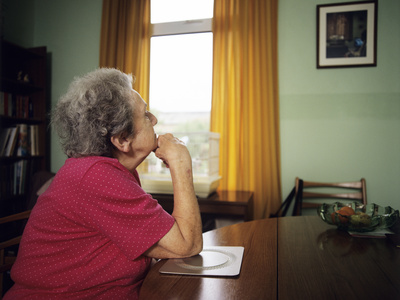From a study by Christian Heim, B. Kichu Naif, Denise Mowbray, and Janelle Tavender:
Baroque music has been shown to encourage the production of alpha brain waves, leading to a calm, more relaxed state of the mind. The ideals of Baroque music, including evoking a consistent, balanced state of mind and rhythmic precision could be beneficial to patients in dementia units. There is however no evidence to suggest that Baroque music actually fulfils these ideals. We used slow, calm Baroque music by composers such as Bach, Handel, Vivaldi, Corelli and Telemann to overcome the logistic problems posed by the use of patient-preferred music and the cost-limitations of one-to-one music therapy. As far as we are aware this is the first study in this area of non-patient preferred ambient music.
Method
A six week observational study was carried out on 14 patients with dementia in Maroba nursing home, Newcastle NSW. This included two weeks of baseline observations, three weeks of observation with the ambient Baroque music, with a one week ‘washout’, that is, further observation without the intervention. The study was approved by the ethics committees and written informed consent was obtained from all carers. No assessment was made on the severity of dementia symptoms. Six hours of Baroque music was recorded, representing more than 50 individual pieces of slow music written between 1600 AD and 1750 AD. Four hours of this music was played at a quiet but easily audible volume level from 3-7 p.m. each evening [emphasis added]. The music did not interfere with normal conversations but, through means of speaker systems, was audible in all common areas and bedrooms of the unit. Staff recorded incidences of the following adverse behaviours: episodes of calling out, wandering, aggression, talking to self, verbal abuse, other signs of agitation and need for night sedation. The observation and recording of adverse behaviours were a regular part of staff work, although we did ask staff to rate these episodes as ‘mild’, ‘moderate’ or ‘severe’ according to pre-planned criteria. An Adverse Behaviour Score (ABS) was devised for each patient based upon the number and severity of adverse behaviour events per day according to the formula: number of adverse behaviours x severity of episodes, where mild = 1, moderate = 2 and severe = 3. A questionnaire on the process for staff and carers was also used.
Results
The incidence of adverse behaviour events was reduced by over 40% during the intervention period [emphasis added].
Brief report: Average adverse behaviour score per patient per day during the baseline period was 1.3. This dropped to 0.8 (59% of baseline) during the intervention period and rose to 1,2(86% of baseline) during the washout period [emphasis added].
This result was consistent for all patients except for one whose ABS did not change significantly during the intervention period. The use of night sedation, which was very low to begin with, did not change. According to the questionnaire, the intervention was deemed acceptable by staff and carers. Staff were generally satisfied with the intervention to patients. However, some staff members were not happy with the additional duty of having to change music cassettes three times during the shift.
Playing Baroque music in the evenings reduced adverse behavior in all but one patient by over 40% after only three weeks. Changing cassettes three times a day seems a small price to pay for this, but perhaps a CD full of mp3s may save the few minutes needed to change cassettes. For those of you with relatives in long-term care, or caring for loved ones at their home or yours, the simple and inexpensive method of playing a CD may work wonders for you. I know that when my family had to deal with behavior problems with an elderly relative, playing music seemed to bring him back to life and his behavior was much more agreeable.
It’s worth discussing with your loved ones’ caregivers and doctors. Show them the research and ask them if they might be willing to try it! It would be extremely interesting to see a longer-term study to determine if this is a cumulative effect. However, after the intervention period the scores rose again, so it’s clear that this has to be a long-term strategy and not a short-term “patch” for disruptive behavior.
